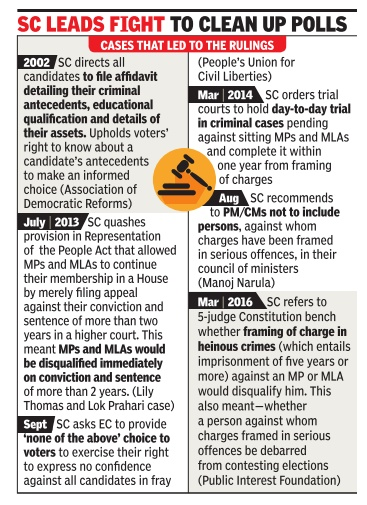Governance
Criminalization of Politics
- 02 Apr 2021
- 6 min read
Why in News
According to the National Election Watch (NEW) and Association of Democratic Reforms (ADR), in the Assembly elections in Assam, Kerala, Puducherry, Tamil Nadu and West Bengal, at least 1,157 out of 6,318 candidates have criminal cases against them.
- NEW is a nationwide campaign since 2002 comprising more than 1200 Non-governmental Organizations (NGOs) and other citizen led organizations working together on electoral reforms, improving democracy and governance in India.
- ADR is an Indian NGO established in 1999 situated in New Delhi.
Key Points
- About:
- The criminalization of politics means the participation of criminals in politics which includes that criminals can contest in the elections and get elected as members of the Parliament and the State legislature. It takes place primarily due to the nexus between politicians and criminals.
Legal Aspect of Disqualification of Criminal Candidates
- In this regard, Indian Constitution does not specify as to what disqualifies a person from contesting elections for the Parliament, Legislative assembly or any other legislature.
- The Representation of Peoples Act 1951 mentions the criteria for disqualifying a person for contesting an election of the legislature.
- Section 8 of the act, i.e. disqualification on conviction for certain offences, according to which an individual punished with a jail term of more than two years cannot stand in an election for six years after the jail term has ended.
- The law does not bar individuals who have criminal cases pending against them from contesting elections therefore the disqualification of candidates with criminal cases depends on their conviction in these cases.
- Reasons for Criminalization:
- Lack of Political Will:
- In spite of taking appropriate measures to amend the RPA Act, there has been an unsaid understanding among the political parties which deters Parliament to make strong law curbing criminalisation of politics.
- Lack of Enforcement:
- Several laws and court judgments have not helped much, due to the lack of enforcement of laws and judgments.
- Narrow Self-interests:
- Publishing of the entire criminal history of candidates fielded by political parties may not be very effective, as a major chunk of voters tend to vote through a narrow prism of community interests like caste or religion.
- Use of Muscle and Money Power:
- Candidates with serious records seem to do well despite their public image, largely due to their ability to finance their own elections and bring substantive resources to their respective parties.
- Also, sometimes voters are left with no options, as all competing candidates have criminal records.
- Lack of Political Will:
- Effects:
- Against the Principle of Free and Fair Election:
- It limits the choice of voters to elect a suitable candidate.
- It is against the ethos of free and fair election which is the bedrock of a democracy.
- Affecting Good Governance:
- The major problem is that the law-breakers become law-makers, this affects the efficacy of the democratic process in delivering good governance.
- These unhealthy tendencies in the democratic system reflect a poor image of the nature of India’s state institutions and the quality of its elected representatives.
- Affecting Integrity of Public Servants:
- It also leads to increased circulation of black money during and after elections, which in turn increases corruption in society and affects the working of public servants.
- Causes Social Disharmony:
- It introduces a culture of violence in society and sets a bad precedent for the youth to follow and reduces people's faith in democracy as a system of governance.
- Against the Principle of Free and Fair Election:
- Recent Steps by the Supreme Court to Curb Criminalization of Politics:
- In February 2020 Supreme Court (SC) ordered the political parties to publish the entire criminal history of their candidates for Assembly and Lok Sabha elections along with the reasons that forced them to field suspected criminals.
- The SC in Public Interest Foundation vs Union Of India, 2018 had also directed political parties to publish online the pending criminal cases of their candidates.
Way Forward
- Various committees (Dinesh Goswami, Inderjeet Committee) on the electoral reforms have recommended for state funding of elections which will curb use of black money to a large extent and thereby will have a significant impact on limiting criminalization of politics.
- Regulating the affairs of a political party is essential for a cleaner electoral process. Therefore, it is imperative to strengthen the election commission.
- Voters also need to be vigilant about misuse of money, gifts and other inducements during elections.
- Given the reluctance by the political parties to curb criminalisation of politics and its growing detrimental effects on Indian democracy, Indian courts must now seriously consider banning people accused with serious criminal charges from contesting elections.







